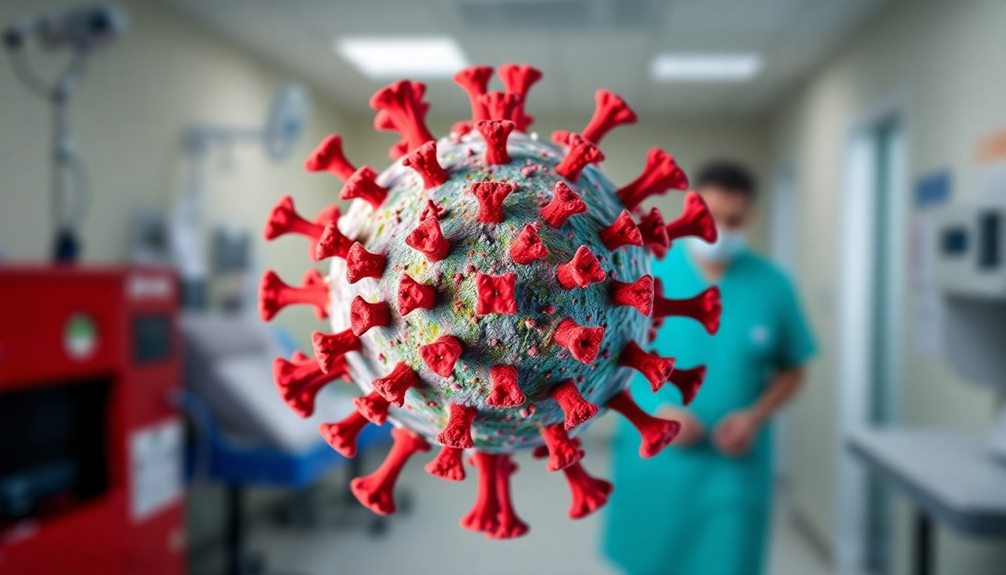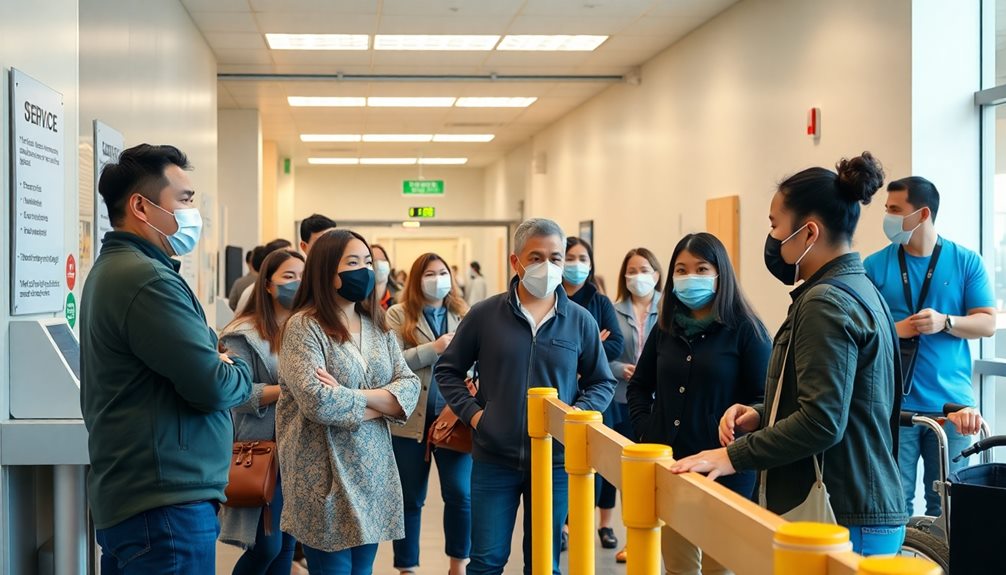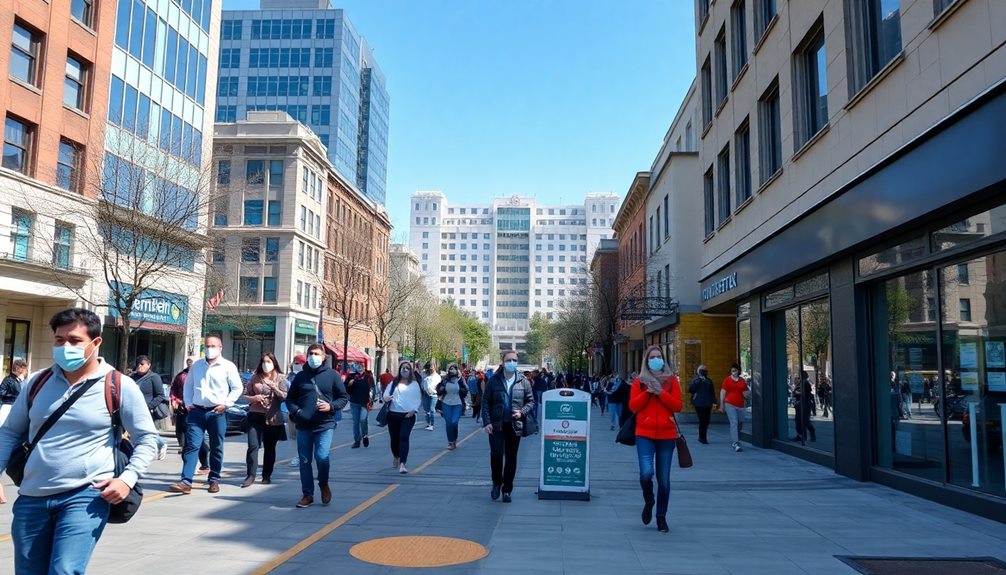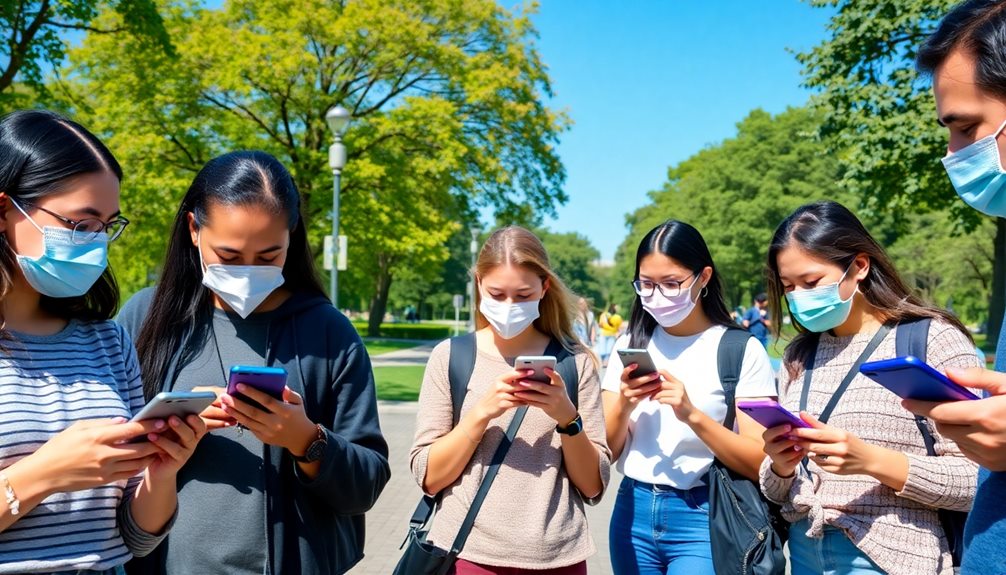Coronavirus, specifically SARS-CoV-2, has drastically changed your daily life since its discovery in late 2019. It's not just a cold; it can cause severe respiratory illness, leading to over 704 million cases and 7 million deaths globally as of October 2023. You've likely noticed shifts in public health guidelines, with an emphasis on vaccination, mask-wearing, and hygiene practices to minimize transmission. This ongoing pandemic influences everything from dining experiences to mental health. Staying updated on local regulations is essential for your safety and community wellbeing. There's a lot more to explore about its impact and evolving health measures.
Key Takeaways
- Coronaviruses, including SARS-CoV-2, can cause respiratory illnesses, with COVID-19 being the most severe outbreak since its identification in December 2019.
- The pandemic has resulted in over 704 million cases and more than 7 million deaths globally, impacting public health systems significantly.
- Preventive measures like vaccination, mask-wearing, and hygiene practices are essential to reduce transmission and protect community health.
- Local health guidelines vary by region and are crucial for ensuring safety during dining and public interactions amid fluctuating COVID-19 cases.
- Continuous adaptation to health guidelines and staying informed about local conditions are vital for individual safety and public health outcomes.
Introduction

Coronaviruses, with their crown-like spikes, belong to a family of viruses that can lead to a range of illnesses from mild colds to severe respiratory conditions, including COVID-19. The SARS-CoV-2 virus, responsible for the COVID-19 pandemic, was first identified in December 2019 and has since transformed public health across the globe. The name "coronavirus" comes from the Latin word *corona*, which means crown, aptly describing the virus's appearance.
Coronaviruses are classified into four genera: Alphacoronavirus, Betacoronavirus, Gammacoronavirus, and Deltacoronavirus. They possess a single-stranded RNA genome, which is crucial for their ability to replicate and evolve.
Transmission primarily occurs through respiratory droplets when you're in close contact with someone infected. You can also contract the virus through surfaces contaminated with respiratory secretions.
The COVID-19 pandemic has underscored the significant impact coronaviruses have on public health, with over 704 million confirmed cases and more than 7 million deaths as of October 2023.
This health crisis has prompted worldwide efforts to understand and combat these viruses, emphasizing the importance of hygiene, vaccination, and community awareness.
Unique Health Crisis Impact

Amidst the turmoil of the COVID-19 pandemic, the profound impact on public health systems has become glaringly evident. Over 7 million deaths and more than 704 million total cases globally showcase the strain placed on health infrastructures worldwide.
In the United Kingdom, lockdowns and restrictions not only disrupted daily life but also led to significant economic downturns, revealing the deep interconnectedness between health and economic stability.
As you navigate this crisis, you'll likely notice a surge in mental health challenges among those around you. Anxiety and depression have become increasingly common as isolation and uncertainty take their toll. This growing strain can manifest in various ways, from withdrawal to heightened irritability, making it crucial to address these concerns proactively. Interestingly, emerging research has highlighted the connection between gut health and mental health, suggesting that our emotional well-being is closely tied to the state of our digestive system. By nourishing both mind and body, we can foster resilience and better cope with the ongoing challenges.
Educational institutions faced unprecedented disruptions, forcing millions of students into online learning, which highlighted disparities in access to technology and resources.
Furthermore, the pandemic has raised global awareness of public health practices, emphasizing the necessity of vaccination, hygiene, and preparedness for future health crises.
The COVID-19 data collected during this period will likely inform strategies for addressing similar challenges in the future.
As you reflect on these issues, consider how they've reshaped our understanding of public health and the importance of resilience in facing such unique health crises.
Signature Dishes and Specialties

The pandemic's far-reaching effects extended beyond public health, influencing culinary practices worldwide. As restaurants faced lockdowns during the Coronavirus (COVID-19) crisis, many stopped reporting traditional dining experiences and pivoted to takeout and delivery. This shift led to adaptations of signature dishes, such as Italy's iconic pasta and China's beloved dim sum, to meet new safety measures and consumer preferences.
At home, you may have noticed a surge in interest in cooking, with folks experimenting with traditional recipes like sourdough bread in the U.S. and homemade dumplings across various Asian cuisines. The desire for comfort foods also grew during isolation, with Spain's paella and Mexico's tacos making a notable comeback on dinner tables.
However, global food supply chain disruptions affected ingredient availability, pushing both chefs and home cooks to innovate. You might've seen creative substitutes or local options incorporated into these classic dishes, showcasing resilience in culinary traditions.
Experience and Atmosphere

Often, the experience of dining out shifted dramatically during the pandemic, as fear and uncertainty loomed over public spaces. You might've noticed that the atmosphere became charged with anxiety; people hesitated at the entrance of restaurants, scanning for signs of safety.
Social distancing measures led to empty tables and quieter spaces, altering the vibrant buzz of conversation that once filled dining rooms.
Isolation took a toll on many, amplifying the longing for connection. You may have felt the weight of this during your outings, where interactions felt different—more cautious, tinged with concern. The heightened awareness of hygiene became palpable; hand sanitizers sat prominently at every entrance, and masks became a standard part of the dining experience.
Cities adapted, transforming public spaces into outdoor dining havens. You likely saw new pedestrian-only zones and open-air markets emerge, providing a semblance of normalcy.
However, the atmosphere remained a blend of hope and apprehension as communities navigated these changes together. The pandemic reshaped not just how you dined, but also the very essence of social interaction, leaving a lasting impact on how you perceive public spaces.
Service and Accessibility

As the atmosphere of dining out evolved, so too did expectations around service and accessibility. With the pandemic reshaping our world, restaurants and service providers had to adapt quickly. You might notice that many establishments are now prioritizing accessibility, ensuring that everyone can enjoy their dining experience regardless of their circumstances.
COVID-19 data reporting has shifted as well, with the WHO moving to weekly updates as of August 25, 2023. This change came in response to inconsistent reporting from various countries, emphasizing the importance of accessible information. You can now access COVID-related datasets easily through platforms like data.who.int, which allows you to explore data via an API under the Creative Commons Attribution 4.0 International License.
Additionally, the WHO aggregates data from various sources, including health ministries and social media, to provide comprehensive regional analyses. Their dashboard updates every Friday, reflecting laboratory-confirmed cases and deaths from the previous two weeks.
This commitment to transparency and accessibility in information empowers you, the public, to stay informed and make better decisions regarding your health and safety while dining out.
Location and Practical Information

Dining out during the ongoing pandemic requires you to stay informed about location-specific guidelines and practical information. Since COVID-19 was first identified in Wuhan, it has spread globally, resulting in over 704 million confirmed cases. With more than 22 million active cases still reported, understanding your local situation is crucial.
Different regions have implemented varying travel restrictions and quarantine protocols, impacting entry requirements and public health guidelines. Before you head out, check for any specific mandates in your area regarding mask-wearing, vaccination proof, or capacity limits at restaurants.
Crowded and enclosed spaces pose higher risks, so consider dining outdoors whenever possible. Stay updated on the latest health regulations, as they can change rapidly based on local transmission rates.
If you're in an area with high transmission, preventive measures like social distancing and mask-wearing are advised. Always be prepared to adjust your plans according to the situation, as ongoing transmission underscores the importance of vigilance.
Final Thoughts and Recommendation

Staying informed about local guidelines and health measures not only ensures your safety but also enhances your dining experience. The COVID-19 pandemic has affected millions, with over 704 million confirmed cases and around 7 million deaths. As you navigate this landscape, prioritizing vaccination is crucial. It remains a key preventive measure against severe illness and the emergence of new variants, especially in areas where vaccination rates are low.
With major health organizations transitioning to weekly reporting, you'll find improved data consistency and accuracy. However, remember that variability in case detection across countries can complicate your understanding of the overall situation. Staying aware of these discrepancies will help you make informed decisions.
Lastly, don't overlook the ongoing research into long COVID. Understanding its effects is vital for grasping the pandemic's long-term health implications. By keeping yourself educated on these developments, you not only protect your health but also contribute to the collective effort in combatting this virus.
Check Local Health Guidelines

Understanding local health guidelines is crucial for navigating the ongoing pandemic safely. These guidelines can differ significantly from one region to another and often change based on current case trends and vaccination rates. To protect yourself and others, you should stay informed about the specific recommendations in your area.
Many local health authorities recommend wearing masks in crowded or indoor settings, especially where social distancing isn't feasible. This simple step can significantly reduce transmission risks.
If you're eligible, getting vaccinated is strongly encouraged, and local health departments provide detailed information on available vaccines and eligibility criteria.
Additionally, be aware that some regions may enforce travel restrictions or quarantine protocols for those coming from areas with high infection rates or new variants. Keeping up with these regulations is essential for your safety and the safety of your community.
To stay informed, regularly check announcements from your local health department. They offer the most current recommendations and regulations, ensuring you're making informed decisions during these uncertain times.
Frequently Asked Questions
What's the Difference Between Coronavirus and COVID?
COVID-19 is the disease caused by the specific coronavirus SARS-CoV-2. In contrast, "coronavirus" refers to a broader family of viruses, including those that cause illnesses like the common cold.
What Are the Symptoms of the New Coronavirus?
You might experience fever, cough, fatigue, or a loss of taste or smell. Other symptoms can include shortness of breath, body aches, sore throat, and gastrointestinal issues like diarrhea. Pay attention to these signs!
How Long Are You Contagious With the Coronavirus?
You're typically contagious for about 10 days after symptoms start, with peak contagiousness occurring 1-2 days before symptoms appear. It's crucial to isolate and wear a mask to prevent spreading to others.
What Is the Definition of the Coronavirus?
A coronavirus is a type of virus characterized by its crown-like appearance. It primarily infects mammals, causing respiratory illnesses. You'll find it has a single-stranded RNA genome, which plays a key role in replication.
Conclusion
In these challenging times, you can still enjoy unique culinary experiences while staying safe. Remember to check local health guidelines before heading out. Embrace the flavors and specialties that bring comfort, and don't forget to appreciate the atmosphere that makes dining special. Your health and well-being come first, so choose places that prioritize safety and accessibility. With a little planning, you can savor delicious meals and support your favorite local spots. Enjoy your dining adventure! Consider pairing your dining outings with other mindful activities to enrich your experience, such as taking yoga classes in Florence to rejuvenate both your body and spirit. Exploring new routines can make for a more holistic and fulfilling journey, balancing indulgence with self-care. By staying proactive and thoughtful, you can create meaningful moments that nurture both your palate and your well-being. Consider blending your love for gastronomy with activities that harmonize mind and body for a truly enriching experience. For instance, joining wood music garden yoga courses can provide you with a tranquil escape while complementing the joy of savoring delightful meals. By weaving these mindful practices into your routine, you can elevate your journey of self-discovery and relaxation, all while supporting local businesses and wellness initiatives.









